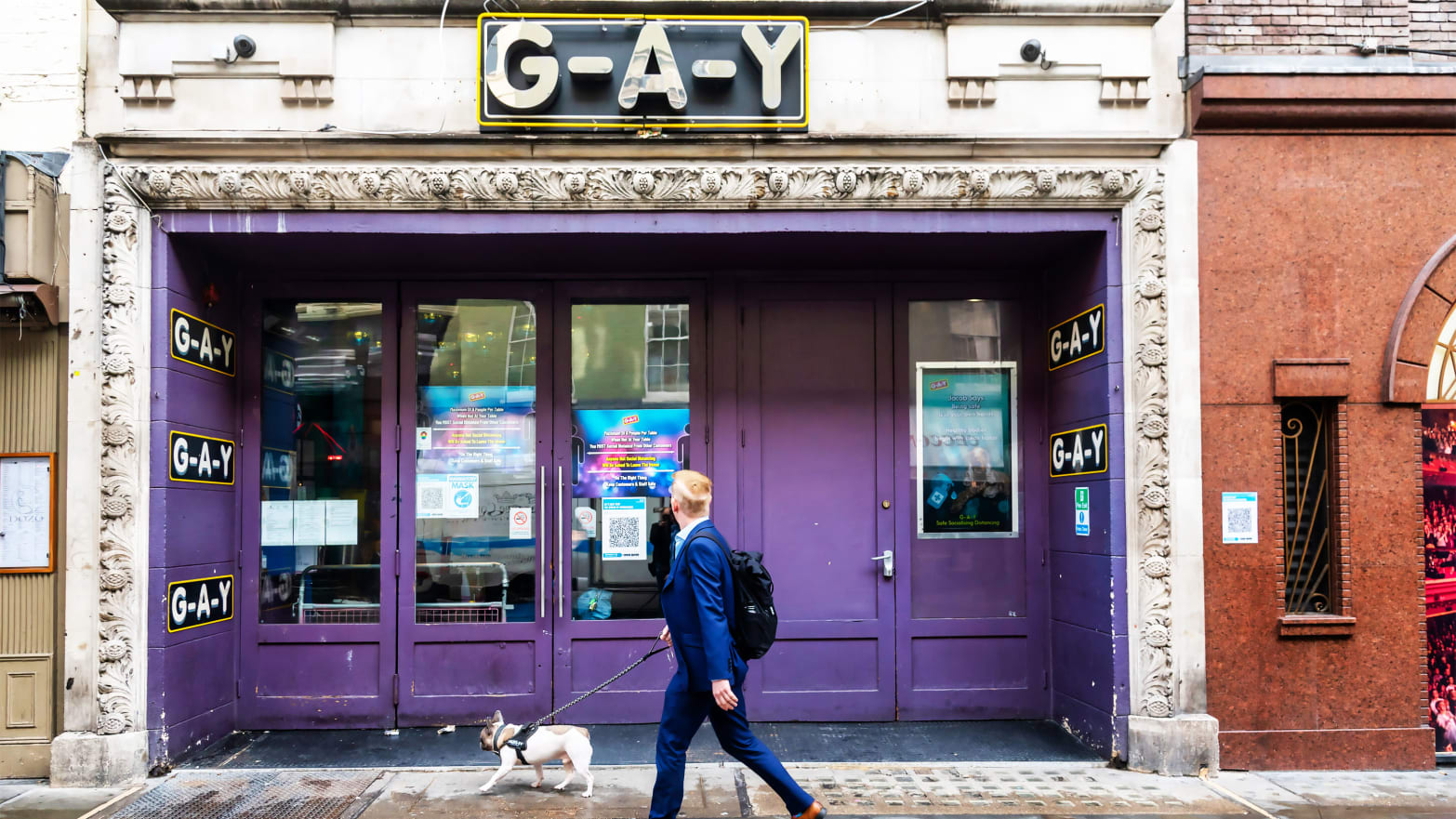I started reading about the demise of gay bars long before I uploaded my first torso pic onto Grindr. And yet, every weekend, the lines outside of my city’s remaining gay spaces often extended for several blocks—leaving overzealous twinks to freeze in their cut-offs.
Gay men are social creatures. While COVID has presented extreme challenges to the nightlife industry, history shows we’ve always found ways to gather, no matter the circumstances. So why would this time be any different?
“We've gone through far worse as a community, whether it’s HIV/AIDS, fighting for our rights, being discriminated against, the violence against LGBTQ people,” said Erik Storholm, a licensed clinical psychologist in West Hollywood. “I have every reason to think our community is going to bounce right back.”
There’s no denying the current landscape for gay establishments is bleak. Yelp says 59 gay bars in America closed between March 2020 and August 2020, though that number seems low, considering 17 percent of restaurants have shut down permanently. “I would’ve thought it would be closer to that,” said Greggor Mattson, a sociology professor at Oberlin College. His research shows 37 percent of gay bars closed nationwide from 2007 to 2019.
But the picture isn’t entirely negative. While queer bars have struggled for a while, gay nightlife has continued to thrive in the form of standing parties and off-the-grid events. Places that have been able to invest in kitchens are also finding ways to stay afloat, creating new revenue streams in the process.
James Clements, co-owner of Blend, an LGBTQ lounge in Boston, took COVID as an opportunity to modernize his kitchen and patio space. The place was packed for drag brunch every Sunday. “It took off,” Clements said. “I mean, we didn't make a ton of money, but we kept the business alive.”
Whenever Boston lifts restrictions on nightlife, Clements expects to be there, and is confident business will thrive. But that might not be for a while, even with vaccination rates rising. There’s still no timetable for when bars and clubs can operate again in Boston, and the city’s Pride parade was recently postponed. “People get their hopes up, so I think people are just canceling things to be on the safe side.” Clements said.
While Storholm is sensing more optimism among his clients these days, there still aren’t many social events on their calendars. Above all, there’s a profound sense of loneliness in the community. “Pride events, summer parties, these are things that members of the community who might feel a little disconnected in their daily life look forward to,” Storholm said. “And we just don't know when or if those things are coming back.”
One study of 10,000 gay men in 20 countries aged 18-34 found those who only left their homes for essentials during the first COVID lockdowns were 37 percent more likely to feel anxious than those who didn’t, and 36 percent more likely to feel lonely. While these struggles aren’t unique to gay people, it’s important to remember that gay men “come to this pandemic with disproportionate rates of mental health issues,” says Ian Holloway, a UCLA associate professor of social welfare and the study’s lead author.
Through the early months of lockdown, Jay represented those statistics. Entrapped in his studio apartment, the Los Angeles-based social worker was on the mental brink. All day long, he fielded calls from LA’s most vulnerable residents, pleading for food and services. It is demanding work, and pre-COVID, Jay would find his nirvana on the dance floor.
So when Jay started reading about parties taking place outside of LA, he was tempted to go, and finally, he did. “I know people are like, ‘You guys are so shallow. How could you consider nightlife so important?,’” he said. “But for someone like me, it is. People need me to be there for them. Going to parties, and going to gatherings have helped me be able to be at my 100 percent, and be able to help others through this difficult time.”
Since the start of COVID, gays have been blasted for attending raucous raves and beach parties, with the conflict bubbling over into an online gay civil war. At the start of the new year, #GaysOverCovid accounts started popping up all over social media, outing circuit queens and InstaThots for their drug-fueled rendezvous to tropical meccas like Puerto Vallarta and Rio de Janeiro.
There is an ugly element of privilege to this behavior, and even worse, it goes against every public health guideline. With restrictions prematurely loosening in many states, we’re experiencing a resurgence in cases nationwide. Now is not the time to let up.
“Large in-person gatherings aren’t going to be safe for some time,” said Alex Keuroghlian, director of the National LGBTQIA+ Health Education Center at the Fenway Institute, a community health center in Boston where half of the patients are LGBTQ. “It sounds like gatherings like that realistically won’t be safe or advisable before fall 2021, unfortunately.”
But there’s more to these semi-clandestine circuit raves than reckless revelers. They speak to our desire for companionship. “There is a need for spaces to gather and to have community,” said Justin Smith, director of the Campaign to End AIDS at Positive Impact Health Centers. “How do you do that in a pandemic in a way that doesn't put you in harm’s way, or the ones that you care about and that you love in harm’s way? I don't think anyone has figured out a great solution to that.”
That’s where harm reduction strategies come into play. The HIV/AIDS crisis taught us the futility of abstinence-only messaging, and the dangers of stigmatizing pleasure. With that in mind, Keuroghlian says it’s important to focus on risk-mitigation techniques, and recognize most people are going to negotiate their own rules. “There’s a level of flexibility and cultural humility that we as clinicians need to have,” he said.
Virtual raves and events are one way to keep the party safe, and throughout COVID, we’ve seen DJs take their sets to the digital space. On the positive side, online parties are far more accessible, allowing all members of the community to partake in the debauchery. Even when COVID subsides, it’s possible venues could still stream their drag competitions and burlesque shows online--creating a hybrid model. The end result would be a more inclusive nightlife scene, and that’s good for everybody.
“There’s been tremendous talk about how people with disabilities can now go to things they could never go to before,” Mattson said. “If you’re a drag queen, whether you get your tips by Venmo or crumpled up dollar bills, it’s all the same to you.”
While that may be true, from this twunk’s perspective, there’s nothing quite like the smell of poppers oozing throughout the sweat-soaked walls of A-House in Provincetown at 1:15 a.m. on the Fourth of July. Going out is about more than just hearing music. It’s about the whole hedonistic dance.
“There’s a whole culture that has its own sort of scripts and kind of how you show up and how you perform,” Smith said. “I think those things can't really be translated into an online forum.”
As gay men, we’ve already been robbed years of social development, and COVID hasn’t been helpful. “Overall, I think it’s been really detrimental to our community, which relies on the chosen family,” said Storholm. “Everyone’s been focused on staying safe from the virus, but what about the detrimental impact that social isolation and loneliness have on people?”
The good news is, with 90 percent of the U.S. population projected to be vaccinated by July 24, this summer promises to offer the chance for more connection. Joe Piro, the rare mid-twentysomething who was once ambivalent about going out, says he never realized how important the routine was to him. He can’t wait to get his shot, and line up outside of a club again to pay an outrageous cover.
“I’m anticipating almost like a Roaring Twenties sense of freedom,” Piro said. “People being locked away for so long, that first night out, I picture it being a cracking electric energy of pent-up sexual tension. I will not be surprised if people are fucking in the street.”

